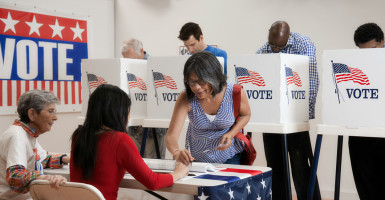An 11th state looks ready to join a national movement to sideline the Electoral College and decide presidential elections by popular vote.
A bipartisan bill moving through the Arizona legislature aims to reallocate the state’s 11 electoral votes to the presidential candidate who wins the majority of votes on a national scale rather than the candidate who wins the state.
The legislation is part of a nationwide push called the National Popular Vote plan, an effort to create an agreement among states that vow to automatically elect the president of the United States using the national popular vote instead of the final vote count in each respective state.
Robert Hathorne, a Republican activist residing in Arizona, warns that the initiative would “fundamentally change America” by shifting the national political system from a representative democracy to a pure democracy.
“Majority rules was the greatest fear of our Founding Fathers; this is why ‘democracy’ is not written one time in the 4,543 words of the Constitution,” Hathorne told The Daily Signal.
The framers of the Constitution established the Electoral College to give smaller states a voice against larger states when selecting the nation’s leader. Electoral votes are delegated based on a state’s population. Rhode Island, for example, has four electoral votes, while California has 55.
A presidential candidate currently needs a majority of 270 of the Electoral College’s 538 votes to win the White House.
Hans von Spakovsky, a senior legal fellow at The Heritage Foundation, said the National Popular Vote initiative seeks to breach the Constitution and likely would end up in the U.S. Supreme Court.
“This entirely changes how the president is elected, and therefore, it affects the basic structure of the Electoral College and the Constitution,” von Spakovsky told The Daily Signal.
Advocates are working to secure support from enough states to reach 270 guaranteed electoral votes, which effectively would throw the outcome of presidential races into the hands of the popular vote.
So far, 10 heavily Democratic states—California, Hawaii, Illinois, New Jersey, New York, Maryland, Massachusetts, Rhode Island, Vermont, and Washington—have joined the District of Columbia in signing such legislation into law.
Those states make up 165 electoral votes, meaning the initiative has reached roughly 60 percent of the 270 votes needed to reach its goal of sidelining the Electoral College. Arizona would make it 176. The pact won’t go into effect until enough states sign on to hit 270 votes.
Instead of amending the Constitution to eliminate the Electoral College, popular vote advocates are working around the challenging ratification process by going through the states.
Doing away with the Electoral College completely requires a constitutional amendment, meaning two-thirds of both the House and Senate would have to vote for repeal, and then another three-fourths of the states would have to ratify the new amendment.
The National Popular Vote initiative instead works on the state level through an interstate compact requiring far fewer states to support the new process and reach 270 electoral votes. In fact, that number could have been as low as 11 states.
Article I, Section 10 of the Constitution reads: “No state shall, without the consent of Congress … enter into any agreement or compact with another state or with a foreign power.”
Heritage’s von Spakovsky notes that the Supreme Court clarified this provision in the case Virginia v. Tennessee, ruling that only those interstate agreements that increase state power while diminishing federal power must be submitted for congressional approval.
If the National Popular Vote effort reaches its goal of 270 electoral votes, von Spakovsky predicts, the states that decided not to join the pact immediately will file a lawsuit and ultimately land the case in the Supreme Court.
Opponents of national elections by popular vote, including von Spakovsky and Hathorne, argue that the change would create incentives to commit voter fraud in single-party states and jurisdictions.
In deep-blue New York, for example, the incentive for voter fraud isn’t high, because residents know the state is going to elect a Democrat regardless. But if you move from a state-by-state voting system to a national one, von Spakovsky warns, the incentive to “stuff” voting boxes rises: Not only would a Democrat win New York, but he or she could win the national election.
“Why should as few as 12 to 15 states that make up 270 electoral votes rule over 35 other states?” Hathorne asked.
Proponents such as those working for FairVote, for example, argue that the Electoral College creates a “winner takes all” system that drives disparity between “swing” states, where candidates actively campaign, and “solid” states, which the organization says are largely ignored.
Advocates of a popular vote say the change would make every state significant during the election process.
Today, it’s possible for candidates to secure the White House without winning the popular vote across the nation.
In 2000, George W. Bush won the presidency after the Supreme Court determined he had won Florida even though Al Gore, his Democratic opponent, won the majority of votes nationally. Bush edged Gore by five electoral votes.
The National Popular Vote movement sprung up in the mid-2000s following Gore’s contentious defeat. Through it, a candidate could win a plurality of the national vote and clinch the big seat.
The change “would make recounts an absolute nightmare,” von Spakovsky said, adding:
If electing a president is based entirely on who wins the national popular vote, if that were the 2000 situation, it would have forced a recount in the entire country because every single vote could’ve made a major difference.
In Arizona, the legislation enjoys broad support from both parties in both the House and Senate. But von Spakovsky says voters actually will lose influence if the state switches to the popular vote idea.
He said paid lobbyists, backed by enormous amounts of money, are feeding state legislators “false information” to advance the movement.
“The legislators who have signed on this are being fooled and are being foolish in voting for it,” von Spakovsky said.



























